

Program or be programmed. Program or Be Programmed: 10 Commands for a Digital Age. Thanks to digital technologies and networked activity, we’re living through a global transition that is redefining how culture and commerce operate.
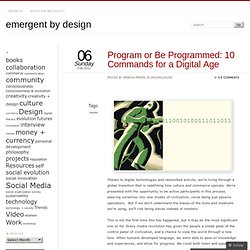
We’re presented with the opportunity to be active participants in this process, steering ourselves into new modes of civilization, verse being just passive spectators. But if we don’t understand the biases of the tools and mediums we’re using, we’ll risk being slaves instead of masters. OR Books — Program or be Programmed: Ten Commands for Digital Age, by Douglas Rushkoff. About the Book The debate over whether the Net is good or bad for us fills the airwaves and the blogosphere.
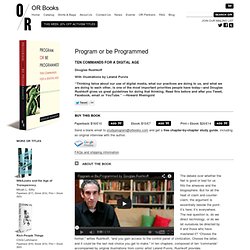
But for all the heat of claim and counter-claim, the argument is essentially beside the point: it’s here; it’s everywhere. The real question is, do we direct technology, or do we let ourselves be directed by it and those who have mastered it? “Choose the former,” writes Rushkoff, “and you gain access to the control panel of civilization. Choose the latter, and it could be the last real choice you get to make.”
Can the Internet Replace Big Banks? Douglas Rushkoff, a media theorist, author, and documentarian.
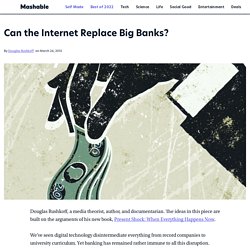
The ideas in this piece are built on the arguments of his new book, Present Shock: When Everything Happens Now. We've seen digital technology disintermediate everything from record companies to university curriculum. Yet banking has remained rather immune to all this disruption. Sure, ATMs and online banking may threaten the bank teller's union, but central banking's monopoly over money has hardly budged. Just like we have to get our food from real plants and animals, we have to get our money from real banks. However, the rapidly changing digital economy is about to give banks a run for their money. LET IT DIE: Rushkoff on the economy. “Final Bell” by Arik Roper (UPDATE: “Hack Money, Hack Banking” by Douglas Rushkoff, the March 20 follow-up to “Let It Die,” is available here.)
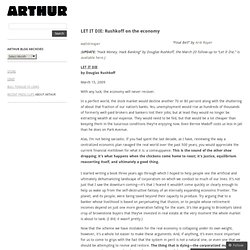
LET IT DIE by Douglas Rushkoff March 15, 2009 With any luck, the economy will never recover. In a perfect world, the stock market would decline another 70 or 80 percent along with the shuttering of about that fraction of our nation’s banks. LifeIncTheMovie. Life Inc. Books Life Inc.
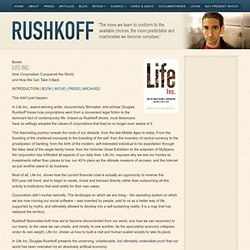
How Corporatism Conquered the World,and How We Can Take It Back This didn't just happen. In Life Inc., award-winning writer, documentary filmmaker, and scholar Douglas Rushkoff traces how corporations went from a convenient legal fiction to the dominant fact of contemporary life. Indeed as Rushkoff shows, most Americans have so willingly adopted the values of corporations that they're no longer even aware of it. This fascinating journey reveals the roots of our debacle, from the late Middle Ages to today. Most of all, Life Inc. shows how the current financial crisis is actually an opportunity to reverse this 600-year-old trend, and to begin to create, invest and transact directly rather than outsourcing all this activity to institutions that exist solely for their own sakes. Corporatism didn't evolve naturally. Douglas rushkoff (rushkoff) Douglas Rushkoff. Open Source Democracy by Douglas Rushkoff - Projet Gutenberg.
Open Source Democracy. Books Open Source Democracy Buy now from Amazon How online communication is changing offline politics Foreword by Douglas Alexander, Member of UK Parliament The internet has become an integral part of our lives because it is interactive.
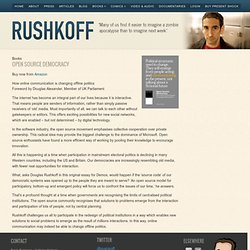
Douglas Rushkoff - Home. Present Shock. Present Shock Buy from Amazon, BN.com, Indiebound, Books A 'Million Download Preview NY Times ReviewWall Street Journal excerpt Present Shock on Colbert Report Video: Present Shock Explained in 15 Minutes Present Shock Readers/Study Guide.
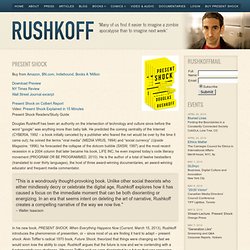
Present Shock- explained in 15 minutes. Why Living in the Present Is a Disorder. The opening titles sequence of Game of Thrones conveys a presentist style.
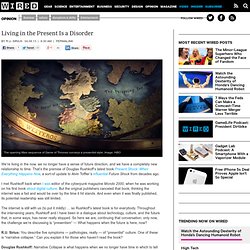
Image: HBO We’re living in the now, we no longer have a sense of future direction, and we have a completely new relationship to time. That’s the premise of Douglas Rushkoff’s latest book Present Shock: When Everything Happens Now, a sort-of update to Alvin Toffler’s influential Future Shock from decades ago. Douglas Rushkoff. Education in “Present Shock” : An interview with Douglas Rushkoff. Note: An mp3 of this interview is available for download.
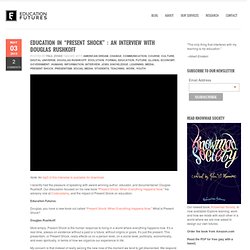
I recently had the pleasure of speaking with award-winning author, educator, and documentarian Douglas Rushkoff. Our discussion focused on his new book “Present Shock: When Everything Happens Now,” his advisory role at Codecademy, and the impact of Present Shock on education. Education Futures: The Next Net. Skip to content NOW SERVING Psychedelic Culture Menu Search Cart Facebook-f.
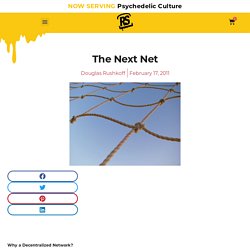
Cyberia (book) Cyberia is a book by Douglas Rushkoff, published in 1994. The book discusses many different ideas revolving around technology, drugs and subcultures. Rushkoff takes a Tom Wolfe Electric Kool Aid Acid Test style (or roman à clef), as he actively becomes a part of the people and culture that he is writing about. The books goes with Rushkoff as he discusses topics ranging from online culture, the concept of a global brain as put forth in Gaia theory, and Neoshamanism. The Next Net. The moment the "net neutrality" debate began was the moment the net neutrality debate was lost. For once the fate of a network - its fairness, its rule set, its capacity for social or economic reformation - is in the hands of policymakers and the corporations funding them - that network loses its power to effect change. The mere fact that lawmakers and lobbyists now control the future of the net should be enough to turn us elsewhere.
Of course the Internet was never truly free, bottom-up, decentralized, or chaotic. Yes, it may have been designed with many nodes and redundancies for it to withstand a nuclear attack, but it has always been absolutely controlled by central authorities. From its Domain Name Servers to its IP addresses, the Internet depends on highly centralized mechanisms to send our packets from one place to another. I'm not trying to be a downer here, or knock the possibilities for networking. That's right. Douglas Rushkoff in Real Life. Douglas Rushkoff. Keynote: Douglas Rushkoff on When Change is Always On.
Douglas Rushkoff on returning to religious core values. Douglas Rushkoff. Everyone seems to have A.D.D. these days. (In case you’ve been too distracted by your Twitter feed to remember, A.D.D. stands for Attention Deficit Disorder -- the inability to focus on any one thing for too long, the urge to do nine things at once, and the hyper, constantly shifting, unsettled feeling that goes along with it.) Apparently, it’s an epidemic -- particularly among boys, and especially among those who love video games. Douglas Rushkoff. Douglas RushkoffThis nOde last updated November 27th, 2004 and is permanently morphing…(9 Ix (Jaguar) / 17 Keh (Red) – 74/260 – 12.19.11.11.14) “The mission of the cyberspace counterculture is to explore unmapped realms of consciousness and to RECHOOSE REALITY consciously and purposefully.”
“they don’t call it programming for nothing!” – re: television - Douglas Rushkoff. Douglas Rushkoff is professor of media culture at New York University’s Interactive Telecommunications Program. Douglas Rushkoff. Douglas Rushkoff (born 18 February 1961) is an American media theorist, writer, columnist, lecturer, graphic novelist, and documentarian. He is best known for his association with the early cyberpunk culture, and his advocacy of open source solutions to social problems. Rushkoff is most frequently regarded as a media theorist and is known for coining terms and concepts including viral media (or media virus), digital native, and social currency. Rushkoff currently teaches in the Media Studies department at The New School University in Manhattan.[7] He has previously lectured at the ITP at New York University’s Tisch School of the Arts and taught a class called Narrative Lab.[8] He also has taught online for the MaybeLogic Academy.[9] Biography[edit] Background[edit] Rushkoff was invited to participate in government and industry as a consultant ranging from the United Nations Commission on World Culture and the US Department of State to Sony Corporation and TCI.
Influences[edit] Themes[edit] Douglas Rushkoff Quotes (Author of Life Inc.) Douglas Rushkoff.